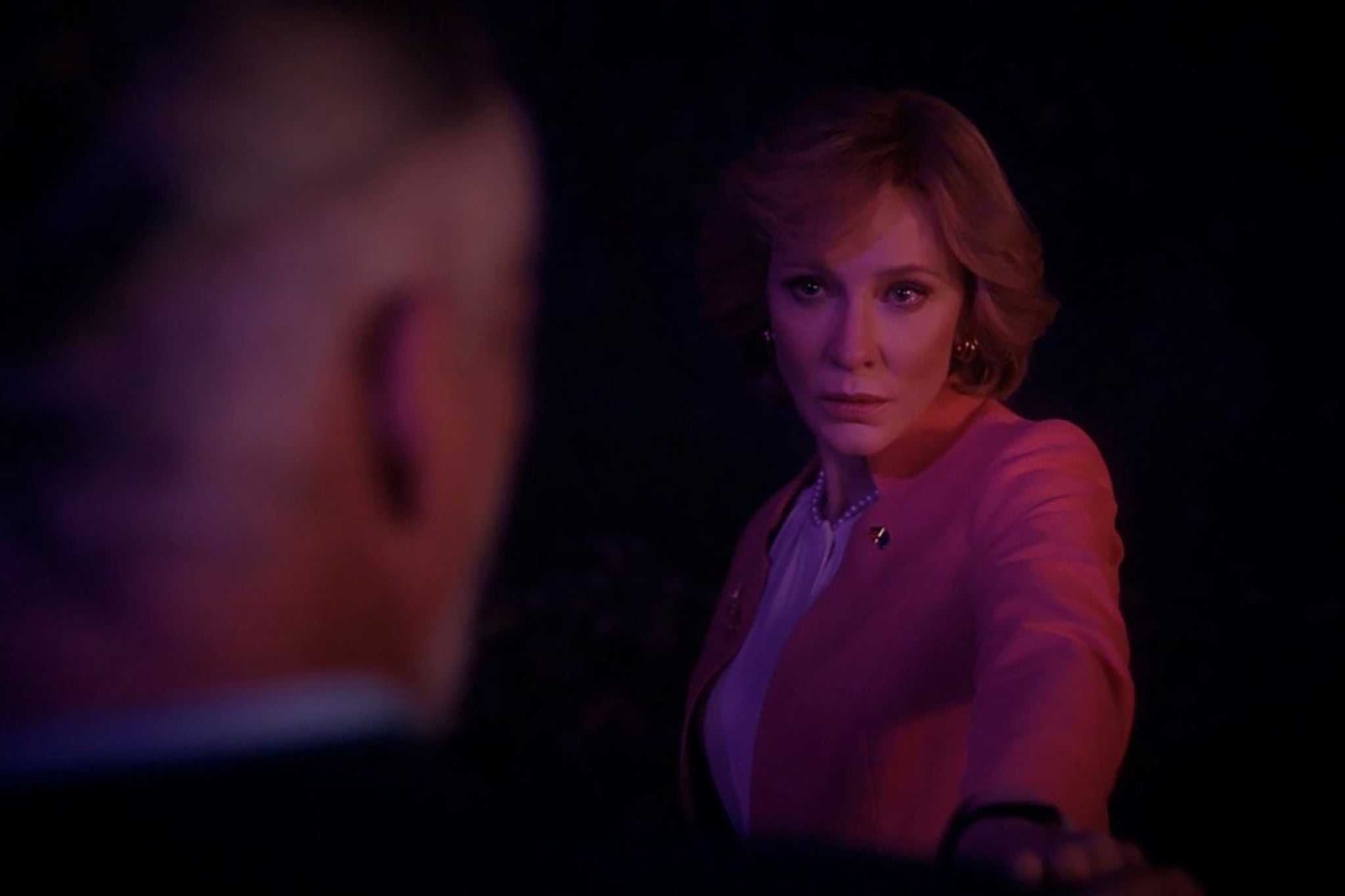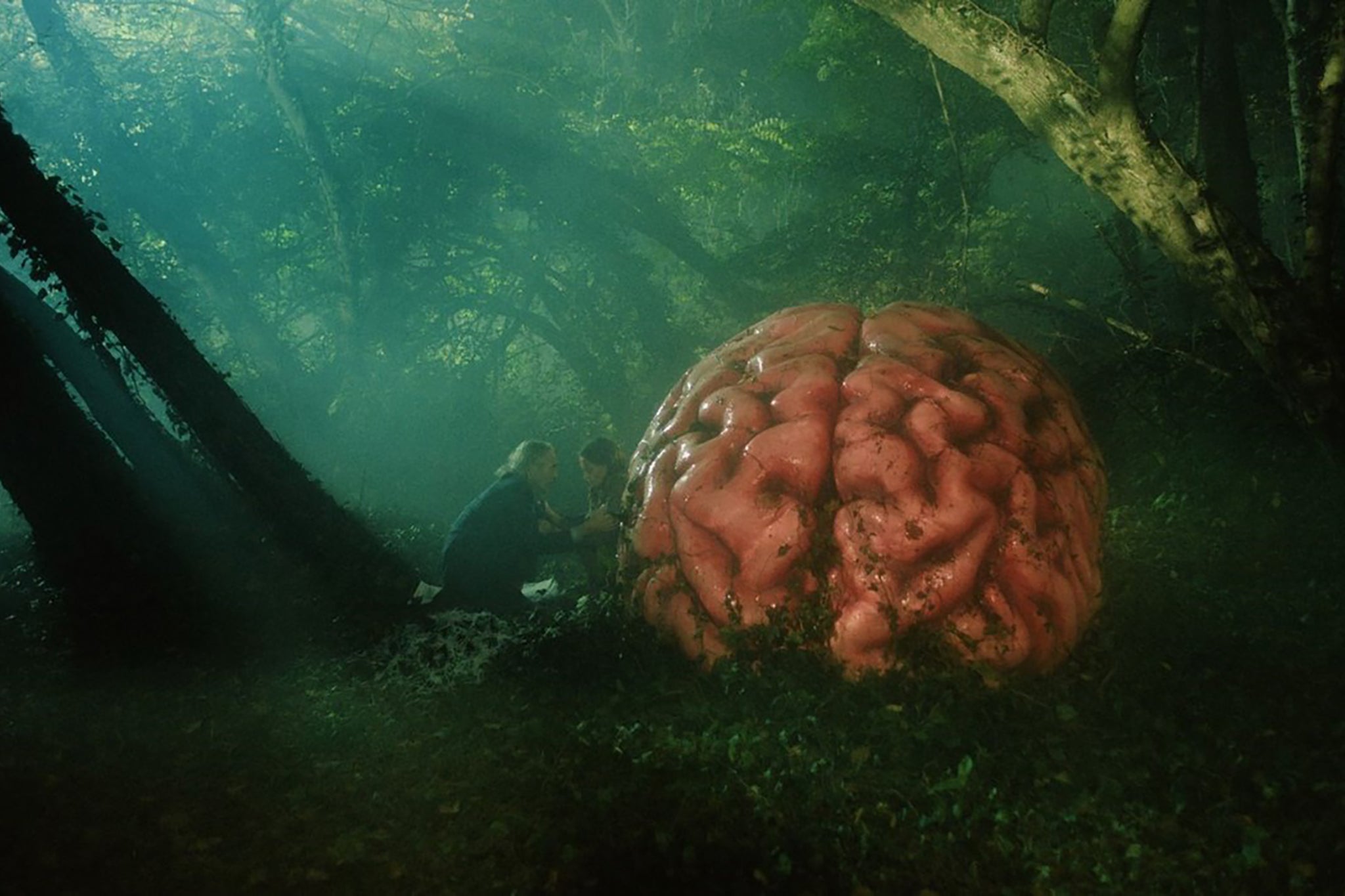
That’s why you cast me, wasn’t it?” says Cate Blanchett, addressing the Canadian filmmaker Guy Maddin. He’d just relayed his mission statement: “I want my work to be both beautiful and stupid at the same time.”
Maddin is the quiet king of dreamlike fantasias that make David Lynch look sedate. In films such as My Winnipeg, The Forbidden Room and The Saddest Music in the World, he’s made a mockumentary about himself, riffed languorously on the memories of a moustache, and given Isabella Rossellini prosthetic legs filled with beer.
Blanchett, meanwhile, is a two-time Oscar winner and mercurial superstar, as comfortable in arthouse drama such as Tár as she is in a blockbuster like Ocean’s 8. She’s also, every once in a while, slightly mad. There she is performing with Sparks at Glastonbury. There she is playing 13 different women for a 130-minute art installation for German surrealist Julian Rosefeldt. There she is with a bright red fright wig in Borderlands, quite possibly the worst film of 2024. Blanchett, it goes without saying, likes a bold swing. So it’s somewhat inevitable that she and Maddin would eventually cross paths.
Blanchett loves a bit of silliness. “Anything really perverse and playful can be deemed as being a bit stupid,” she says. “But it’s important to be in that space. You need to approach every film script or theatre text as if you know nothing. You have to muck around with them. You can’t be too reverential. Because stupidity is incredible. Even when you’re dealing with the G7.”
We’re meeting over Zoom to talk about Rumours, an apocalyptic political comedy (with masturbating zombies, obviously) about world leaders who find themselves lost in a dark German forest. While the trees burn to the ground around them, they speak loudly about very little and seem to walk forever in circles. There may be a metaphor in there. Blanchett is the German chancellor, an elegant fool with a history in racist theatre productions. Charles Dance, as the president of the United States, keeps falling asleep. Alicia Vikander, as a representative of the European Union, is obsessed with an enormous glowing brain she’s found in the woods.
“It looked like you could get a teaspoon and have a little bite of it, didn’t it?” Blanchett asks me, with dramatic élan. “But, honestly, I think it was probably toxic.”
I think you have to have a healthy lack of consequence as an actor. It’s a big difference if you seek to go about and offend people. But I think it’s great to gently nudge people or provoke a conversation
“It was made out of latex, then filled with something like a thousand monkey brains so it’d have the right weight,” Maddin explains, stone-faced and lying (hopefully).
Blanchett winces. “You’ll need to put a trigger warning for vegans on this article, Adam.”
Maddin shakes his head. “No, no, Cate, these monkeys had died of old age. It’s fine. They’d donated their brains.”
Blanchett nods emphatically. “But I can’t talk about that – I signed an NDA.”
Blanchett, 55, is in a sunny hotel room in London, dressed in a blood-red power suit, her hair cut into a sharp blonde bob. Maddin, 68, is in the dark shadows of his home office in Winnipeg, Canada. The pair share a fun, circular rapport: Maddin provides the deadpan set-up, Blanchett the gentle, self-mocking retort.
When it came to Rumours, Maddin and his regular collaborators, brothers Galen and Evan Johnson, had spotted an inherent ridiculousness to the G7, that annual get-together of global power players determined to get things done and set agendas. They’d watch hours of footage of leaders shaking hands and standing awkwardly in lines. “It’s a bit like the Christmas fireplace channel,” he jokes, of that baffling 24-hour broadcast found at the far reaches of cable television that shows nothing but a roaring fire. “And it’s so exciting to watch them – these strange rituals, and strange bits of geopolitical choreography. And they talk as if they’re in some kind of Iron Age trance.”

Blanchett was already a fan of Maddin’s, and got her hands on the Rumours script via its producer Ari Aster, the eccentric genius behind Midsommar and Beau Is Afraid. She adored it. “It deliberately avoids being pigeonholed as a political satire or a B-grade thriller or a monster movie,” she says. “Just when you think you know what Rumours is, it turns another corner.”
In her role as an ambassador for the UN Refugee Agency, Blanchett has orbited the real political world for a while, and she tells me she has a degree of empathy for the politicians she’s met. “They’re human beings labouring under systems that don’t serve them or anybody else,” she says. “The big elephant in the room is overpopulation, really, and climate change, and it’s really difficult for any single person or any single country to approach these things. You’re constantly trying to make the family Christmas work while knowing it’s going south.”
On this subject, though, Maddin insists that Rumours is apolitical. You can vaguely see Joe Biden in Dance’s US president, and there’s a touch of Angela Merkel to Blanchett’s character, but never enough that it feels like overt pastiche. “We made sure the politicians’ ideologies were neutered,” he says. “They really could have been a bunch of plumbers, or high school alum getting together in a forest.”
I’m not entirely convinced of that, but part of the thrill of Rumours, Blanchett says, is the debate it inspires. “What I love about this film – and maybe this is inherently political – is that it avoids answering the question of ‘what is this film actually about?’ I love that perversity in cinema. I’m not so keen on it in politics.”

Does she ever get nervous about talking about politics as a public figure? She wrinkles her nose. “I think you have to have a healthy lack of consequence as an actor,” she says. “It’s a big difference if you seek to go about and offend people. But I think it’s great to gently nudge people or provoke a conversation.”
She understands, though, why some actors might be reluctant to add their voices to political discourse. “You get asked those questions and suddenly an off-the-cuff comment gets repeated in Portuguese and then in Mandarin, and back into French, and then vaguely into English,” she says. “Then a journalist says, ‘but you said this’, and I can’t remember it and it’s put up there as a headline next to something that is genuinely important.”
In what is ever so possibly a total coincidence, we happen to be speaking a few days after she apologised for calling herself “middle class” in an interview.
“So I don’t think actors are frightened,” she continues, “they just don’t want to get in the way. Your job is to do what you do, and sometimes the best response is to go out there and be a good person and try to make good work.”
How long that will go on for Blanchett, though, has been the subject of some debate. She has been open in recent years to pondering if not retirement then at least a slow retreat from public life. In one interview, during the promotion of her prickly 2022 epic Tár – which netted her an eighth Oscar nomination – she suggested she might even pack it all in to make cheese.
“Oh, that’s such a good idea!” she says when I remind her. “See I have all these good ideas but I never realise any of them. I just keep acting – I’m terribly sorry.”
In all seriousness, though, she does think about it. “I think my natural state is to dig a little hole underground and burrow in for the winter,” she says. “It takes a lot to get me to come out of it and work. But then you get seduced by great artists who are doing interesting things, and it’s a way of staying connected. Even though my natural instinct is to be quiet – she says, while sitting here talking to The Independent.” She breaks into a laugh. “So there’s a disingenuous quality to all of this, too.”
Rumours tussles with some of the bigger questions, too: what will the end look like? Does any of this matter in the long run? What are we doing here? I’m curious if Blanchett and Maddin ever think about total annihilation.
“Oof,” Blanchett says. “I just lost some bladder control.”
“I hate to think about it,” Maddin says. “But I don’t think the message of the film is that the world is going to end. That’s just a narrative trajectory. You’ve got to take it to the end of the world for it to be a proper bedtime story.”
Blanchett slightly disagrees.
“But, Guy, the film does tap into the things that keep people awake at night,” she says. “It just does it in a way that sort of holds your hand through the darkness. So, yes, it’s a bedtime story, but it also giggles with you under the duvet.”

What they can agree on, at least, is that Rumours – named, abstractly, after the classic Fleetwood Mac album that was created amid chaos, tension and love affairs – is completely, majestically inexplicable.
“We’ve made a genre all to ourselves,” Maddin says. “Which, of course, makes it impossible for our distributors to market the film.”
“It helped, though, that you cut out the big, Esther Williams swimming pool musical number,” Blanchett shoots back. “That probably made it easier.”
I think she’s making this up. But who can really say?
‘Rumours’ is in cinemas







